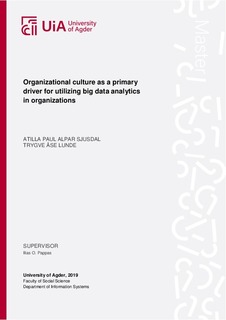| dc.contributor.author | Sjusdal, Atilla Paul Alpar | |
| dc.contributor.author | Lunde, Trygve Åse | |
| dc.date.accessioned | 2019-09-12T08:07:13Z | |
| dc.date.available | 2019-09-12T08:07:13Z | |
| dc.date.issued | 2019 | |
| dc.identifier.uri | http://hdl.handle.net/11250/2616480 | |
| dc.description | Master's thesis Information Systems IS501 - University of Agder 2019 | nb_NO |
| dc.description.abstract | Context:During this last decade we have witnessed a wave of digital disruption, where big data has had a central part. This has gotten many organizations to pay attention and investing in analytic tools for big data. Big data analytics can provide organizations with more knowledge from more data sources that can have a big impact on how organizations act. Many of the organizations that have purchased big data analytics have failed to derive benefits from it and this is demonstratedin the literature. Organizational culture is mentioned as being an important part of achieving success when adopting big data.Purpose: The purpose of this thesis is to investigate the effect that organizational culture has on big data adoption, more specifically the organizations big data analytic capabilities. To measure this, we looked at the organization’s performance.Methods: We decided to use a quantitative approach to answer the research question. In order to define the different constructs of this research, we conducted a systematic literature review where we based the study on.We conducted a survey that we distributed to organizations within Europe that were using big data. The items of the survey were carefully developed by looking at previousmeasurements of these constructs and evaluating them with our supervisor, Ilias Pappas. We managed to get 104 respondents where they were all using big data in their work. We then developed a model with three different hypotheses and analysed the responseby using partial least square path modelling (PLS-SEM). This was done by using the tool, SmartPLS.Results: Our analysis validated our three hypotheses. The first one that focused on the positive effect organizational culture have on big data analytic. Second, organizational cultures positive effect on big data analytic capabilities. Final, hypothesis showed that organizational culture had a positive effect on intangible resources.Conclusion: We can conclude the research by confirming that organizationalculture has a huge effect on big data analytic capabilities and organizations need to look at organizational factors as well as the technical when they are investing in big data solutions. Keywords: Big data, big data analytics, big data analytic capabilities, organizational culture, firm performance | nb_NO |
| dc.language.iso | eng | nb_NO |
| dc.publisher | Universitetet i Agder ; University of Agder | nb_NO |
| dc.rights | Attribution-NonCommercial-NoDerivatives 4.0 Internasjonal | * |
| dc.rights.uri | http://creativecommons.org/licenses/by-nc-nd/4.0/deed.no | * |
| dc.subject | IS501 | nb_NO |
| dc.subject | big data | nb_NO |
| dc.subject | big data analytics | nb_NO |
| dc.subject | big data analytic capabilities | nb_NO |
| dc.subject | organizational culture | nb_NO |
| dc.subject | firm performance | nb_NO |
| dc.title | Organizational culture as a primary driver for utilizing big data analytics in organizations | nb_NO |
| dc.type | Master thesis | nb_NO |
| dc.subject.nsi | VDP::Teknologi: 500::Informasjons- og kommunikasjonsteknologi: 550 | nb_NO |
| dc.source.pagenumber | 72 p. | nb_NO |

